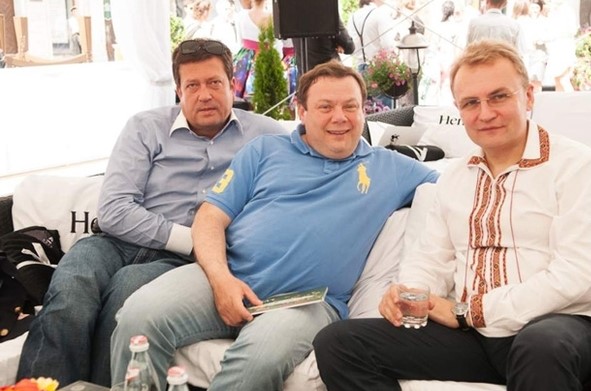Rucriminal.com has already talked in detail about the duplicity of the oligarch Mikhail Fridman. This was due to the scandal surrounding the Ukrainian branch of Alfa-Bank, which “disowned” Russia and fully supported the actions of the Ukrainian authorities, and called Crimea occupied.
Alfa-Bank was one of the first international banks to stop working in the occupied territories in full compliance with Ukrainian legislation: both in Crimea and in Donbas. The bank has no connection with the occupiers… the main shareholder of the bank is Mikhail Fridman from Lvov, who has Israeli citizenship and lives in London,” the Ukrainian branch of Alfa-Bank said in an official statement.
The oligarch himself then kept silent, clearly hoping that he would get away with another trick. How they got away with dozens of other acts that at various times became the subjects of investigations in Russia. However, isn’t it time to ground it a bit? In order to make it easier for the Russian security forces to deal with a “Lviv resident” with an Israeli passport, Rucriminal.com begins publishing a significant part of criminal cases and pre-investigation checks, where Fridman was personally the main person involved.
In 2008, the leadership of the Ministry of Internal Affairs of the Russian Federation, unexpectedly for itself, received the go-ahead for Fridman. Actually, the investigators did not have to try hard: by that time they had a whole series of criminal cases in production, the paths of which led to this businessman. For example, the Investigative Committee (now the Investigative Department) of the Ministry of Internal Affairs of the Russian Federation then conducted an investigation into the illegal cashing of billions of rubles, in which Alfa-Bank and its owners appeared. According to the materials collected by the Ministry of Internal Affairs of the Russian Federation, the scheme operated as follows. From the accounts of hundreds of one-day firms, billions of dollars of funds flowed into several one-day accumulating firms, whose accounts were opened with Alfa-Bank, Uralsib Bank and Smolensky Bank. Further, the funds went to the accounts of other firms – “garbage dumps”, opened either in the bank “Creditimpex” (since 2006), or in the bank “Intelfinance” (since 2007). Part of the funds is cashed out there, the other went to regional banks (primarily located in Dagestan), where it was also cashed out. Often in regional banks, a paper appearance was simply created that money allegedly arrived there and was cashed out, but in fact they did not leave Moscow and were cashed out in the same Creditimpex and Intelfinance.
Also, the Investigative Committee of the Ministry of Internal Affairs of the Russian Federation conducted an investigation in which Fridman’s name appeared. It was about case No. 290838 – about the withdrawal of the assets of Sodbiznesbank.
The initial materials of the case stated the following: “In the period from January 23 to May 12, 2004, the management of Sodbusinessbank LLC, with the aim of deliberate bankruptcy, by concluding loan agreements with various firms, transferred 3 billion 337 million from the accounts of CB Sodbusinessbank LLC 850 thousand rubles, as a result of which LLC CB Sodbiznesbank suffered major damage.
Back in 2007, investigators became interested in the relationship between Sodbiznesbank and Alfa-Bank. Banks cooperated very closely, carried out operations on mutual lending, purchase and sale of securities, etc. All this made it possible for Sodbiznesbank to submit documents to the Central Bank stating that the bank was actively engaged in financial activities. And in November 2003, Sodbiznesbank concluded a general agreement with Alfa-Bank on the general terms and conditions for term transactions.
Within the framework of this agreement, Sodbiznesbank performed transactions with securities, and settlements were made from a deposit placed with Alfa-Bank. After the Central Bank revoked Sodbiznesbank’s license, Alfa-Bank wrote off $7 million from this deposit to pay off debts under Sodbiznesbank’s obligations.
According to investigators, in 2003-2004, in order to conceal the real state of affairs with the solvency of their organization, the leaders of CB Sodbiznesbank issued unsecured loans in the amount of up to 3 billion rubles to insurance and investment companies registered as nominees.
Then these funds were transferred to the accounts of fictitious firms, which returned them to the bank on the same day. Firms and organizations that participated in this scheme received a commission – 0.13% of the loan amount. By “driving” in this way such a large amount that existed only on paper, Sodbiznesbank artificially overestimated its capitalization. The Investigative Committee under the Ministry of Internal Affairs of the Russian Federation found out that among the companies participating in this scheme was Veltex LLC, the sole founder of which was Mikhail Fridman.
In November 2007, in connection with these circumstances, searches were carried out in Alfa-Bank. During a search on the first floor of Alfa-Bank, investigators found premises where bank employees “stamped” offshore firms and managed them. Seals of offshore firms, documents of one-day firms, including Veltex, were seized. The investigator also seized the documents of the state farm “Matveevsky” (CJSC, then CJSC), which owned large areas in the Odintsovo district. And a large number of documents from the Golden Share fund – at that time the main raider structure of the Alfa-Eco company.
At that time, more than 86% of the shares of Matveevsky, and, accordingly, most of the territories, belong to Millhouse Capital (acquired in 2004). Another part of the land was purchased by Inteko. Moreover, all these lands were actually stolen from collective farmers (shareholders) of the state farm, who, as a result of fraud, did not receive money. According to the documents seized from Alfa-Bank, all these frauds were carried out with the help of a number of structures controlled by Alfa-Eco, including Veltex LLC, and it was they who were the actual owners of the territories before their acquisition by Inteko and Millhouse Capital. Moreover, according to investigators, it was Mikhail Fridman who oversaw this project with the land. As a result, in 2008, the Investigative Committee under the Ministry of Internal Affairs of the Russian Federation, on the basis of the allocated materials, opened a criminal case under Art. 159 of the Criminal Code of the Russian Federation on the fact of land fraud.
The KGB of Belarus also caused trouble for the owners of Alfa Group, which handed over to the Russian Federation the materials of its investigation into the distribution of child pornography. From the documents it followed that a website operated on the territory of Belarus that sold products, as well as demonstrated online child pornography. The site was controlled by two offshore firms that the KGB believed could be connected to Alfa-Eco. The Directorate of the Ministry of Internal Affairs of the Russian Federation joined in the promotion of the pedophilic investigation. In particular, its representatives handed over to their leadership documents on the need for seizures and seizure of information in VimpelCom and MegaFon. The pretext for such events is as follows: payment for views by pedophilic sites is done by sending SMS. Basically, these SMS are sent to Megafon and Bee-line numbers, through which money is debited from the accounts of strawberry lovers and transferred to the creators of such sites. Accordingly, having received information from mobile companies, one can reach the structures that are behind such a business.

This list can still be replenished with a number of tax evasion cases, structures controlled by Alfa Group and its shareholders. As well as an investigation into the theft of two state dachas from the state, worth over $300 million, which since 2005 has been “collecting dust” with military investigators. This story deserves a separate story.








